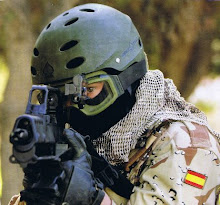
Acording to Defense Update, General Atomics Aeronautical Systems, Inc. (GA-ASI) is teaming with SENER Ingeniería y Sistemas, S.A., a Spanish engineering company, to promote GA-ASI's Predator Unmanned Aerial Systems in Spain.
SENER has said "that the company's expertise in delivering ISR systems to the Spanish Defense and Security Forces through the adaptation and integration of platforms and sensors and its capability to provide in-country operational and logistical support will contribute to the team's offering."
Spain has now several UAV-UAS programs on going.
*****
GA y SENER promocionarán el Predator en España.
Según Defense Update, la empresa General Atomics Inc. se ha aliado con la española de ingeniería SENER para promocionar el UAS Predator en el mercado español.
SENER ha afirmado que la experiencia de la compañía en la provisión de sistemas ISR (inteligencia, vigilancia y reconocimiento) a las FAS y a las FCSE, y su capacidad de apoyo logístico y operativo, contribuirán a la promoción de esta alianza comercial.
España tiene en la ctualidad varios programas de adquisición de UAV-UAS en marcha.
Según Defense Update, la empresa General Atomics Inc. se ha aliado con la española de ingeniería SENER para promocionar el UAS Predator en el mercado español.
SENER ha afirmado que la experiencia de la compañía en la provisión de sistemas ISR (inteligencia, vigilancia y reconocimiento) a las FAS y a las FCSE, y su capacidad de apoyo logístico y operativo, contribuirán a la promoción de esta alianza comercial.
España tiene en la ctualidad varios programas de adquisición de UAV-UAS en marcha.

 Three key ideas:
Three key ideas: -Total expenditure is forecast to increase steadily from EUR9.03bn in 2005 to reach EUR10.15bn by 2010. The defence industry will benefit from planned increases in government expenditure. Restructuring and consolidation in the Spanish and European defence industry, and the state’s continued relinquishment of its hold on the industry, has allowed Spanish firms to increasingly integrate into pan-European and transatlantic markets, and gain greater access to international markets. As a result, arms exports are expected to rise in the near future, and imports are also likely to benefit from the government’s modernisation plans.
-Total expenditure is forecast to increase steadily from EUR9.03bn in 2005 to reach EUR10.15bn by 2010. The defence industry will benefit from planned increases in government expenditure. Restructuring and consolidation in the Spanish and European defence industry, and the state’s continued relinquishment of its hold on the industry, has allowed Spanish firms to increasingly integrate into pan-European and transatlantic markets, and gain greater access to international markets. As a result, arms exports are expected to rise in the near future, and imports are also likely to benefit from the government’s modernisation plans. 

 Future European (France, Germany and Spain) advanced UAV
Future European (France, Germany and Spain) advanced UAV




